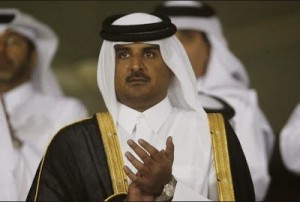Special to WorldTribune.com
ABU DHABI — The Gulf Cooperation Council has sparked a crisis with Qatar over its hosting of the Muslim Brotherhood.
At least three GCC states have withdrawn their ambassadors from Qatar in protest of the emirate’s support of the Brotherhood.

Diplomats said Doha dismissed a GCC assessment that the Brotherhood sought to destabilize Gulf Arab regimes.
“They [GCC states] have exerted massive efforts to contact Qatar on all levels to agree on a unified policy to ensure non-interference, directly or indirectly, in the internal affairs of any member-state,” a statement by Bahrain, Saudi Arabia and the United Arab Emirates said.
The statement, issued on March 5, pointed to the first crisis between the six-member GCC and Qatar under its new emir, Tamim Bin Hamad. Bahrain,
Saudi Arabia and the UAE said Qatar was violating a GCC security agreement signed in November 2013 not to foment unrest in any member-state.
“We are extremely sorry to say that said attempts failed and that the
state of Qatar has still not honored the terms of the agreement,” the
statement said.
Diplomats said virtually every GCC member urged Qatar to stop hosting
the Brotherhood leadership, many of whom fled Egypt after the military
overthrow of its first Islamist president in July 2013. They said the
Brotherhood presence in Doha was helping the Islamist revolt in Egypt as
well as plotting against the UAE. On March 3, a UAE court sentenced a Qatari
to seven years after he was convicted of raising funds for the Brotherhood.
On March 4, the pressure on Qatar climaxed during a meeting of GCC
foreign ministers in Riyad. Diplomats said Saudi Arabia demanded the
expulsion of the Brotherhood presence and the end of Qatar’s support for the
Iranian-sponsored Hizbullah and Shi’ite rebels in Yemen.
“But unfortunately, these efforts did not result in Qatar’s agreement to
abide by these measures, which prompted the three countries to start what
they saw as necessary, to protect their security and stability, by
withdrawing their ambassadors from Qatar starting from today, March 5,
2013,” the statement said.
So far, Qatar, deemed close to Iran, said it would not retaliate for the
withdrawal of the GCC ambassadors. For their part, the diplomats said the GCC would not sever
diplomatic relations with Doha.
Still, the crisis could determine the credibility of Qatar’s Emir Tamim,
who succeeded his father in 2013. Diplomats said the 33-year-old Tamim had
pledged security and other cooperation with Saudi Arabia and the GCC, but
was overruled by his father, Hamad.
“The assessment is that Tamim is the one who smiles and agrees with
everything, while Hamad still calls the shots,” a Gulf diplomat said.

You must be logged in to post a comment Login